Philosophy of John Dewey:
“Pragmatism” in education is the contribution of John Dewey. It was he, who actually brought this particular way of thinking into the field of education as he himself was essentially a pragmatist and an experimentalist. With his thinking and experiments, like all other philosophers has tried to propound his view in regard to God, Living Beings or men and Nature.
His views in regard to all these matters can be summed up in the following manner-
- He believes in the fact that the truth lies not in the various agencies of the cosmos but in the human soul. It is the vision that finds it out. He also believes that those who say that the real power lies in God are, actually mistaken and do not realize the real potentialities of the human soul. To believe in some supernatural power, according to Dewey, is foolishness and superstition. It is the man who is the master of the real power and we need not go out of him to find it out.
- He believes that the development of the human soul is constant. It takes place according to the requirements of society. He also does not believe in the fact that the human soul is a part of the bigger soul called God or Virat in the phraseology of the Indian philosophy, but it is the result of development in accordance with its needs.
- He also does not believe that a pre-determined truth or value is correct. He believes that we live in a dynamic world, which changes from moment to moment. Truth and values are influenced by time, place and change. According to change of time and place our thoughts also change and they influence reality as well. He believes that neither truth is eternal nor beyond human experience.
- Man has been struggling with his environment for a long time for his development and survival and the mind is an instrument with him for that job. It has also developed in the process of his struggle against the environment for his survival. The three faculties of the mind- knowing, feeling and willing, are nothing but a result of the development, needed for the struggle of the man against his environment. With the development, the mind becomes dynamic and thinking also takes new shapes. This also proves the effect that human thoughts are not static. They are dynamic, changeable, developing and grow according to circumstances.
- Knowledge, John Dewey believes, is the result of the development of man for his self-preservation, and so it is also uncertain, dynamic and changeable. Man tries to earn his bread, clothing and shelter, and in the course of time, these things have become part of his natural self and have also gone from generation to generation. But they change according to time and place and do not remain static like the natural or innate tendencies of the animal world.
- Actions are the basis of knowledge. It was not existent prior to the actions, that is what Dewey believes. He also gave greater importance to action as compared to knowledge. He actually believes that it is the action that gives birth to the experiences which ultimately lead to knowledge.
- As has already been said, John Dewey was a great experimentalist. He has said that consciously or unconsciously all of us are carrying out experiments and trying to solve our problems through various experiments.
- Thinking and thinking also value certain steps as enunciated below-
- First of all, we feel difficulty and then.
- Try to locate and define that difficulty.
- After we have located that difficulty, we try to collect and organize the information acquired. This is called the classification of the data.
- After classification, we evaluate the hypothesis and accept or reject the inferences.
- Lastly, we apply the solution in the actual field of life. John Dewey thought that only that particular education will be good which encourages thinking along these lines.
- While making experiments, John Dewey believes that social good should be the ideal and the focal point. Truths that we arrive at, after experiments become our heritage in the field of moral values and they help in our efficiency, and that is why these things are very important in the field of education as well as general life.
- Social good, as already stated, was the main aim of John Dewey. He believed that only that knowledge should be acceptable which brings about social good through action. He adds that only such a truth is the real truth.
- Society and nature help to form the individual or the personality of a man. A man divorced from any of the two loses himself. External i.e. the physique or the body is formed by nature and the internal structure, i.e. thoughts and feelings are the contribution of the society. A man, who is away from all these factors, cannot grow into a balanced personality. He has to merge himself into humanity as a whole and only then his real self can develop and grow. By doing so, he not only builds himself but also creates a serene atmosphere around him that leads to happiness for all.
- According to Dewey, a man without a social set-up is beyond imagination. He develops, along with other people, in society. Philosophy is a means of social justice and action brings about clarity in the thought by using which a man can solve social, political, economic and moral intricacies. Philosophy divorced from life is unimaginable. Man’s active life is the real philosophy and philosophy and education are essentially one and the same things. In the words of Dewey himself, “Philosophy may even be designed as the theory of education in its general phases”.
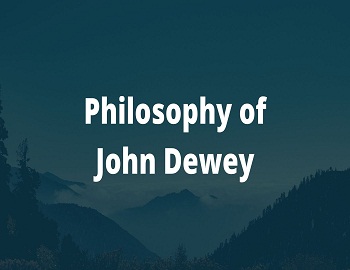

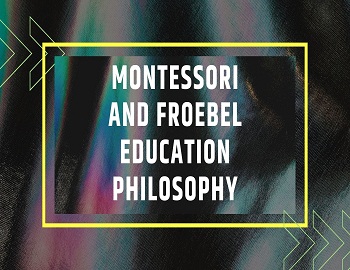

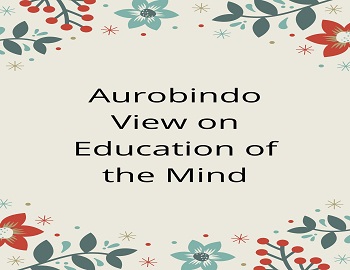
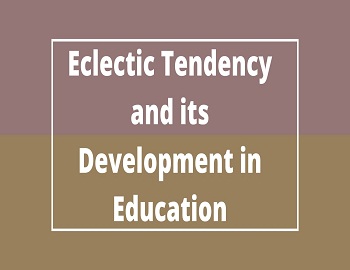


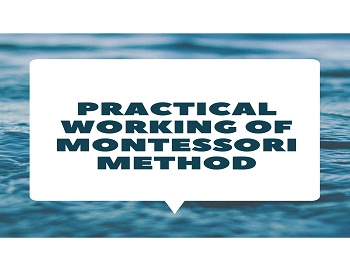
Comments (No)